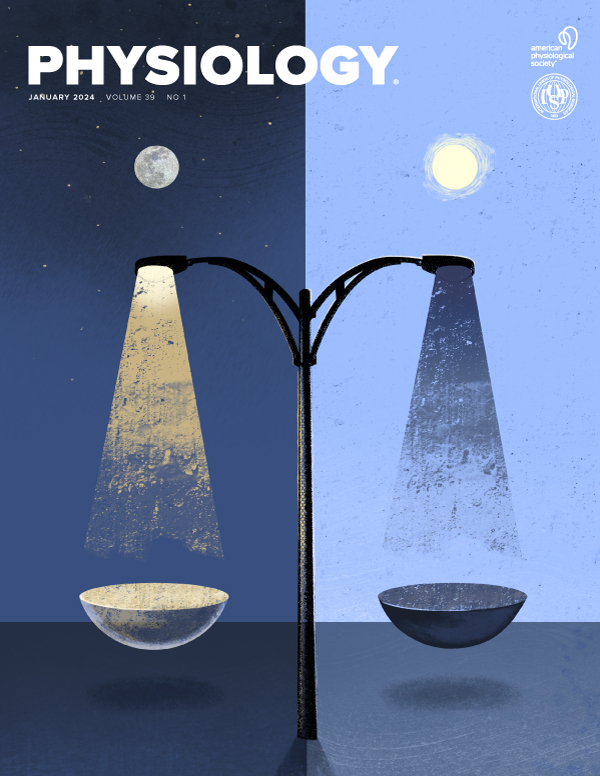The potential role of matrix metalloproteinases on reducing small artery stiffness and improving vasodilation in old spontaneously hypertensive rats
IF 5.3
2区 医学
Q1 PHYSIOLOGY
引用次数: 0
Abstract
Arterial stiffening is a major risk factor for cardiovascular disease development and progression. Both hypertension and aging are associated with presence of microcirculation endothelial dysfunction, hypercontractility, and vascular stiffening. Reports suggest that while hypertension results in inward remodeling, aging is associated with either no changes in internal diameter or outward remodeling with or without increases in wall thickness. Herein, we hypothesized that small arteries from old spontaneously hypertensive rats (SHR) would be inwardly remodeled and stiffer than old normotensive Wistar Kyoto (WKY) rats due to aggravated endothelial dysfunction, hypercontractility, and an increased presence of vascular smooth muscle stress fibers and collagen to elastin ratios. We further hypothesized that these characteristics would be associated with reduced expression of matrix metalloproteinases (MMPs). These hypotheses were tested in mesenteric arteries isolated from 88-week-old SHR and WKY rats. All reported differences are significant at P<0.05. SHRs had increased mean arterial pressure (P), pulse P, and heart weight normalized to body weight vs WKY rats. No differences in small mesenteric artery responses to phenylephrine or acetylcholine were observed between the rat strains. However, responses to the sodium nitroprusside were greater in SHR than in WKY isolated arteries. SHR arteries also had increased wall thickness and wall to lumen ratios, in addition to reduced cross-sectional compliance at 5-40 mmHg intraluminal P and lesser incremental modulus of elasticity at 80-120 mmHg. No differences in content of the extracellular matrices, collagen or elastin, were observed between arteries from either strain, whereas smooth muscle F-actin stress fibers were more abundant in the SHR arteries and MMP-2 and -9 expression were increased in the SHR arteries. In conclusion, these data suggest the interaction of age and hypertension in SHRs is associated with hypertrophic remodeling and increased responsiveness to nitric oxide likely due to increased MMP activity and reduced arterial stiffness. NIH HL-088105-02 to LAM-L This is the full abstract presented at the American Physiology Summit 2023 meeting and is only available in HTML format. There are no additional versions or additional content available for this abstract. Physiology was not involved in the peer review process.基质金属蛋白酶在老年自发性高血压大鼠小动脉硬化和血管舒张中的潜在作用
动脉硬化是心血管疾病发生和发展的主要危险因素。高血压和衰老都与微循环内皮功能障碍、血管过度收缩和血管硬化有关。报告显示,虽然高血压导致向内重塑,但衰老与内径不变或向外重塑相关,但与壁厚增加或不增加有关。在此,我们假设老年自发性高血压大鼠(SHR)的小动脉会因内皮功能障碍加重、过度收缩、血管平滑肌应激纤维和胶原/弹性蛋白比增加而向内重构,并且比老年正常血压的Wistar Kyoto大鼠(WKY)更硬。我们进一步假设这些特征可能与基质金属蛋白酶(MMPs)的表达减少有关。这些假设在从88周龄SHR和WKY大鼠分离的肠系膜动脉中进行了验证。所有报告差异均以P<0.05为显著性。与WKY大鼠相比,SHRs的平均动脉压(P)、脉搏P和心脏重量与体重的标准化增加。各组大鼠肠系膜小动脉对苯肾上腺素或乙酰胆碱的反应无差异。然而,对硝普钠的反应在SHR中比在WKY分离动脉中更大。SHR动脉的壁厚和壁腔比也有所增加,此外,在5-40 mmHg的腔内P下,横截面顺应性降低,在80-120 mmHg时,弹性模量增量较小。细胞外基质、胶原和弹性蛋白的含量在两种应变动脉中均无差异,而平滑肌f -肌动蛋白应激纤维在SHR动脉中更丰富,MMP-2和-9的表达在SHR动脉中增加。总之,这些数据表明,SHRs中年龄和高血压的相互作用与肥厚重塑和对一氧化氮的反应性增加有关,这可能是由于MMP活性增加和动脉硬度降低所致。这是在2023年美国生理学峰会会议上发表的完整摘要,仅以HTML格式提供。此摘要没有附加版本或附加内容。生理学没有参与同行评议过程。
本文章由计算机程序翻译,如有差异,请以英文原文为准。
求助全文
约1分钟内获得全文
求助全文
来源期刊

Physiology
医学-生理学
CiteScore
14.50
自引率
0.00%
发文量
37
期刊介绍:
Physiology journal features meticulously crafted review articles penned by esteemed leaders in their respective fields. These articles undergo rigorous peer review and showcase the forefront of cutting-edge advances across various domains of physiology. Our Editorial Board, comprised of distinguished leaders in the broad spectrum of physiology, convenes annually to deliberate and recommend pioneering topics for review articles, as well as select the most suitable scientists to author these articles. Join us in exploring the forefront of physiological research and innovation.
 求助内容:
求助内容: 应助结果提醒方式:
应助结果提醒方式:


